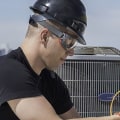A growing population means greater demand for HVAC services, including AC Repair in Glennville GA, as these systems typically have a lifespan of 15 to 20 years. This increase in demand will create even more jobs in the HVAC industry, and automation could replace up to 20 million workers in the manufacturing industry. In the service industry, automation has become indispensable, and many workers worry that their jobs will be obsolete in a few years. A career in HVAC, specifically AC Repair in Glennville GA, will expose you to exciting technologies, and HVAC technicians are in high demand with promising job prospects. Heating, Ventilating, Air Conditioning and Refrigeration (HVAC-R) technicians spend their workdays installing, maintaining, and repairing several indoor climate control systems. If you want to become an HVAC technician, you'll typically want to enroll and complete an HVAC training program at a community college or vocational school.
The good news is that you won't have a problem finding such a program, as their number is growing to meet the growing demand for experienced HVAC professionals. HVAC training programs typically last between six and 24 months, although it depends on the program. As a student of an HVAC training program, you will learn the basics of the HVAC industry that will prove invaluable during your apprenticeship. Upon completion of a program, you will receive more on-the-job training.
There are aspects of the job that you simply need to learn on the job. With some basic facts about the occupation, we will now look at some of the pros and cons of choosing an HVAC technician career. The continued growth of construction, both commercial and residential, is a factor in the projected growth, in addition to the increasing prevalence of service contracts. These contracts help stabilize the workload and income of technicians throughout the year by scheduling maintenance appointments.
The BLS notes that the job prospects of aspiring HVAC technicians who completed an educational training program were more promising than those of their peers who did not complete that program. The point is that if you want to succeed in your career as an HVAC technician, a training program will help you lay the foundation on which you can build your rewarding career. As we mentioned in the initial section, if you decide to become an HVAC technician, you will receive extensive training on working as an entry-level employee once you complete your training program. During this time, you'll earn approximately half of the salary that your fully trained official counterparts earn.
However, the best thing about this is that you'll typically receive wage increases as you master more and more skills on the job. The experienced professionals you'll learn from will transform you from a newbie who just got out of a training program into a full-fledged HVAC technician with a wealth of practical knowledge. Properly functioning air conditioning systems not only reduce environmental impact, but they also help to save consumers money and provide them with optimal comfort in their homes and work environments. This improves your quality of life, which is invaluable.
HVAC technicians can obtain an excess of different certifications, which means competence to work with different machines. That definitely helps reduce injuries. Those who work with refrigerants must pass a test conducted by the Environmental Protection Agency (EPA). Certifications help make HVAC work environments safer, but they don't completely eliminate workplace setbacks, so keep this in mind when considering a career as an HVAC technician. Now that we've laid out some of the pros and cons of the profession, all you need is a place to start your education and career.
Coyne College is one of the highest-rated trade schools in and around Chicago and offers its HVAC-R program during the day and night to fit your busy schedule. The program can be completed in as little as 42 weeks and is offered on the Coyne College campus located in Chicago's Loop district at State and Madison. The Coyne College HVAC-R program will prepare you to perform essential functions as an HVAC-R technician such as installing, maintaining, and repairing systems in various environments. In addition to learning from experienced instructors with significant experience in the field, students also receive professional assistance including mock interviews, internships and help with curriculum. Technicians can work for a contractor or installer or directly with a heating, ventilation and air conditioning manufacturing company. Many jobs are aimed at improving efficiency of systems while reducing negative effects on environment.
Organizations such as Urban League, military veterans organizations, community colleges and training centers help prepare HVAC technicians.


